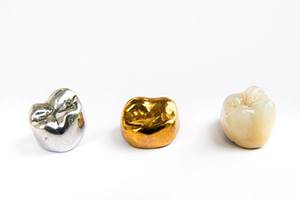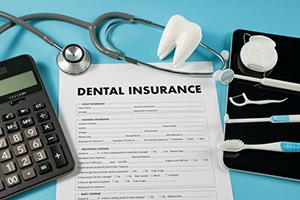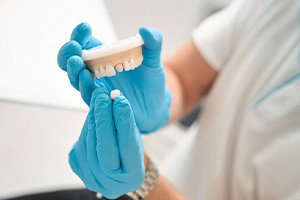
Dental Crowns – Northborough, MA
Restore a Tooth’s Function and Appearance

Dental crowns have been used for generations to strengthen weakened teeth, restoring their function and appearance. Modern crowns can even look almost identical to natural teeth, helping patients to enjoy the confidence that comes with a beautiful smile. If you require a new dental crown, or you believe it is time for one of your old ones to be replaced, contact our Northborough team today to schedule your consultation.
Why Choose Northborough Dental Associates for Dental Crowns?
- One-Visit Restorations Available
- Efficient, Comfortable Treatment
- Long-Lasting results
What Is a Dental Crown?

A dental crown is a tooth-shaped “cap” that gets secured over the entire portion of a tooth that is visible above the gumline. Its job is to restore the tooth’s strength and function, as well as protect it from damage. Crowns can be made out of various materials, such as different metals, porcelain fused to metal, porcelain, and ceramic.
You may benefit from a crown if:
- One of your teeth has been treated with root canal therapy.
- A tooth has significant spots of decay or damage.
- A tooth is severely worn down.
- You have an old, unsightly restoration that you wish to replace.
The Process of Getting a Dental Crown

The traditional process for placing a dental crown takes place across two appointments. At the first appointment, we prepare the tooth by shaping it so it will fit well beneath the restoration. This may require that we file down the tooth or fill it in. Then, we take impressions of the tooth and provide you with a temporary crown. After a laboratory creates your permanent restoration, you will come back for your second appointment, during which we will verify the crown’s fit and attach it to the tooth.
If you opt for a porcelain crown, we may be able to provide you with a permanent crown in just one appointment thanks to our highly advanced CEREC one-visit restoration technology.
The Benefits of Getting a Dental Crown

Some noteworthy benefits of dental crowns include:
- They can restore the function and strength of damaged teeth.
- They are often able to prevent extractions.
- We carefully design crowns so they work well with a patient’s unique bite.
- With proper care, a crown has the potential to last for 15 years or longer.
- Crowns are a versatile treatment that can be useful for addressing a variety of oral health issues.
- A crown can increase your ability to smile confidently and chew all of your favorite foods without discomfort.
- Porcelain and ceramic crowns can look extremely lifelike. No one may be able to tell that you had to undergo some restorative dental treatment!
Understanding the Cost of Dental Crowns

The cost of dental crowns depends on a few factors. During your consultation, we will examine your mouth and design a treatment plan. Then, we can provide a personalized cost estimate. We will also be happy to help you understand your payment options, such as insurance, financing, and our in-house discount plan.
Factors that Affect the Cost of Dental Crowns

Some factors that can affect the cost of your crown include:
- Preliminary care. Some damaged teeth require root canal therapy or other extensive preparations before they are able to support a crown. Such services come with their own fees, which can vary quite a bit.
- The material used to make the crown. Crowns can be constructed out of various materials, which come at different price points. Our team is able to provide metal, porcelain-fused-to-metal, porcelain, and ceramic options. We can help you compare the pros and cons of each one.
- The crown-making process. We partner with a dental laboratory to provide high-quality crowns. We must account for lab fees when determining how much to charge our patients.
Keep in mind that cheaper crowns are not always better, so it is important to be wary of any deals that seem too good to be true. It is best to invest in a high-quality restoration right from the start.
Does Dental Insurance Cover Dental Crowns?

Very often, yes, dental insurance does cover dental crowns. Usually, crowns are classified as a major service, so around 50% of their cost might be covered, up to the amount of your plan’s annual maximum. Our Northborough team welcomes insurance, and we will be happy to help you understand how your benefits apply. We are even in-network with many popular plans, so you can count on us to help you maximize your coverage.
Other Options for Making Dental Crowns Affordable

Other than insurance, additional options that might make it easier to afford your dental crown include:
- Essential Dental plan. This discount plan, designed for patients without insurance, provides a discount on most of the services available in our practice.
- We partner with Sunbit and CareCredit to provide low-interest and no-interest payment plans for qualified patients.
Are you interested in learning more about dental crowns and their cost? Our team would be happy to answer your questions. Get in touch with us today to discover how we can serve you.
Dental Crowns FAQs

The Northborough Dental Associates team is ready to help you experience all the benefits of dental crowns. Prior to requesting your consultation, though, you might want to learn more about this treatment. What can you expect as you embark on your restorative dentistry journey? Below, you will find answers to some common questions about dental crowns. If your specific questions are not listed here, give us a call. We will be happy to help you find the answers you are looking for.
What Are Dental Crowns Made Of?
Dental crowns can be constructed out of various materials. For example, metal crowns are sometimes used to restore molars because metal is so strong. We typically only place metal crowns in the back of the mouth because they do not blend in with the natural colors of the human smile.
Crowns can also be made out of lifelike materials, including porcelain-fused-to-metal. These crowns have a metal inner shell that is surrounded by porcelain, which bears a strong resemblance to natural tooth enamel. 100% porcelain crowns are also available; we even have advanced technology in our office that allows us to create porcelain crowns in a single appointment without the assistance of a dental lab.
Are Dental Crowns Permanent?
Dental crowns require a permanent commitment. During the preparation part of the treatment process, we must significantly modify the tooth that will receive the crown. We do so by removing some of its enamel. The enamel will never grow back, so the tooth will always need a crown to protect it.
However, you should not expect your crown to last forever. It may need to be replaced every 5 – 15 years. You can help it to last as long as possible by sticking to a thorough oral hygiene routine, regularly visiting us for checkups, and taking other reasonable precautions.
How Do You Know When a Dental Crown Needs to Be Replaced?
Here are some signs that your crown might need to be replaced:
- You are experiencing pain in the tooth beneath your crown.
- There are visible signs of damage or wear on your crown. For example, if you have a porcelain-fused-to-metal crown, you might notice a dark line forming at its base.
- The crown feels unstable or loose.
- The crown is interfering with your bite.
The only way to know for sure whether a crown needs to be replaced is by visiting a dentist. We can examine your restoration, take some X-rays, and let you know what we recommend as your next steps.
Do Dental Crowns Get Cavities?
It is impossible for dental crowns to get cavities. However, the teeth beneath them remain vulnerable to decay. Plaque can accumulate along the gumline and sneak beneath your restoration. It can eat away at the underlying dentition, leading to cavities and infections. The best way to prevent this is via thorough oral hygiene. When you brush and floss your teeth, you should be sure to clean along your gumline, including at the base of your crown.